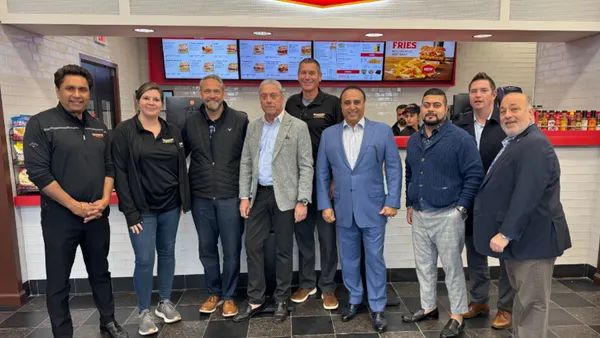Dive Brief:
- North Carolina-based SD Holdings, which operates 73 Sonic Drive-Ins in North Carolina, Tennessee, Virginia and Alabama, has filed for Chapter 11 protection, Restaurant Business reports. The franchisee, which also runs 14 MOD Pizza locations and three Fuzzy Taco Shop restaurants, has accumulated $22.3 million in secured debt.
- The court filing, reported by Restaurant Business, shows that SD Holdings was "facing unsustainable debt loads, an untenable cash position and numerous lawsuits." Additionally, the company noted seasonality to be a factor as well, making cash flow more difficult during cold months.
- Sonic Corp, which is owned by Inspire Brands, plans to acquire the 73 restaurants from SD Holdings.
Dive Insight:
In a statement, Sonic president Claudia San Pedro said these restaurants have a history of strong performance. However, as the Restaurant Business story points out, this franchisee has been navigating cash flow problems since late 2018, when it started taking out cash advances.
Interestingly, that is the same time the drive-in chain was acquired by Inspire Brands for $2.3 billion. This means any cash flow problems the franchisee was experiencing at the time wasn't a priority for the private equity parent company to rectify, causing the franchisee to seek those high-interest advances. Those interest rates combined with seasonality drained the franchisee’s liquidity, the story reports.
But prior to the Inspire acquisition, the brand itself was already navigating eight quarters of sales declines leading up to its eventual sale in 2018, and for the past few years has largely underperformed in the competitive burger segment against giants like McDonald's, Wendy's and Burger King.
Further, the company has been updating its technology capabilities, including its order-ahead app rollout in 2018, which had a "progressive" timeline, and its AI-powered drive-thru menu through a partnership with ZIVELO in 2019. In a tech-forward environment, these investments are becoming increasingly critical, but they can quickly drain the budget of a franchisee operating on thin margins and seasonal fluidity.
In the grand footprint of Sonic's 3,600 or so restaurants, 73 bankrupt restaurants is a recoverable scenario, especially if those restaurants are folding into the massive parent company's portfolio. Indeed, Inspire wouldn't have acquired Sonic if it didn't believe in its long-term success. And as perhaps the most recognizable drive-in chain, Sonic fills a niche void in the quick-service segment, one that the brand may better be able to leverage once its technology investments are realized. But if its major franchisees are having cash flow problems, that illustrates a potentially bigger issue across the brand, such as what has been occurring with Pizza Hut and a major franchisee's financial struggles. However, Sonic's sales and unit counts increased nearly 1% and 0.4%, respectively, in 2018, so the company taking over these 73 restaurants may be the most positive outcome.








